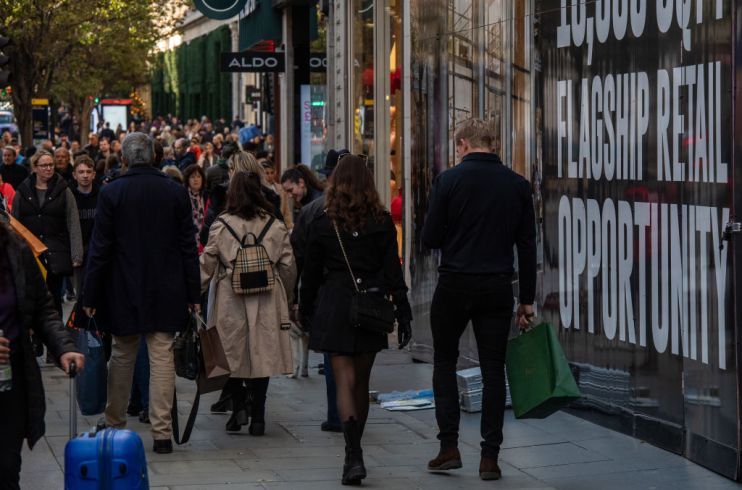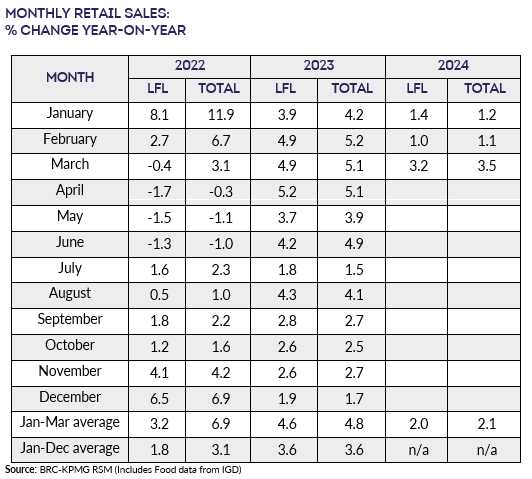Early Easter boosts retail as Brits splash out on food and homeware before summer

This year’s early Easter holidays gave British retail a welcomed boost, as sales rose at a faster rate than inflation for the first time in two years.
Fresh figures from the British Retail Consortium showed UK retail sales were up by 2.5 per cent year on year last month, which is a growth of more than five per cent from last year.
This was also above the three-month average growth of 2.1 per cent.
This comes after a very wet start to the year hit retailers hard. The wettest February on record deterred Brits from heading to the shops.
Retail leaders also issued warnings about impending costs, such as the rise in minimum wage and business rate hikes, urging the government and Labour to take more action ahead of the General Election.
With millions celebrating Easter, food sales increased 6.8 per cent year on year in the three months to March. Meanwhile, cash-strapped Brits decided to put big purchases on hold, with non-food sales down 1.9 per cent. This, according to the BRC, was a steeper decline than the 12-month average.
In particular, Brits went out to buy cooking and tableware to host guests, as well as new homeware to spruce up their houses for the season.

In-store non-food sales also dropped by 1.1 per cent year on year, while online was down 1.4 per cent. This was, however, ‘shallower’ than the the-month and 12-month declines of 3.1 per cent and 2.8 per cent, respectively.
Helen Dickinson, chief of the British Retail Consortium, said: “While retail sales growth improved last month, this was largely driven by Easter falling unusually early and the subsequent uplift to food sales in the week preceding the long weekend.”
Easter also boosted sales of non-food products such as cookware and tableware, as people readied themselves to host family and friends. Home textiles such as throws and pillows were also popular as consumers sought to spruce up their homes ahead of Spring. Elsewhere, wet weather dampened sales of garden furniture, BBQs, DIY products, and clothing and footwear.”
Looking ahead to the summer months, she added that “after a difficult start to the year, retailers are hopeful that with warmer weather around the corner, consumer confidence will spring back up.”
A strong retail industry can boost investment across our towns and cities, and as we gear up for a general election, it is essential the next government recognises this and rethinks the burdensome costs imposed on retailers. With a pro-growth policy landscape, retailers can step up their investment in innovation and in local jobs and communities up and down the country.”

This comes after the Bank of England held interest rates again at 5.25 per cent as inflation continues to fall. However, leading figures at the Bank have warned that rate cuts are still some way off.
Despite the strength in March sales, some economists were sceptical that the trend would last.
“Hands up if you bought an Easter egg,” Rob Wood, chief UK economist at Pantheon Macroeconomics said. “Strong food sales driven by the early Easter boosted the BRC’s measure of retail sales growth in March to its strongest in eight months.”
“We expect the BRC measure of retail sales growth to drop back in April as the boost to year-over-year growth from the early Easter turns into a drag,” Wood continued.
Last week, it was reported that shop price inflation eased to its lowest level since December 2021, driven by falling food costs and supermarkets remaining competitive on price.
Linda Ellett, UK head of consumer markets, leisure and retail at KPMG, said the figures “showed green shoots of spring for retailers in March, with sales growth up a more positive 3.5 per cent on last year, and above headline inflation for the first time in more than two years.”
“High street sales growth was driven by food and drink, health and beauty and keen gardeners who headed outside to enjoy the first days of spring.
“There were also some signs of improvement with more categories starting to see positive sales growth in March for the first time in months. Online sales, however, continued to slide, falling by 1.4 per cent despite strong performances in home accessories, health, beauty, and homewares.”
“As April signals big increases in the sector’s cost base – through the rise in minimum wage rates and business rate hikes for the larger high street brands – retailers will be hoping that the bounce back of March sales is more than just an Easter blip.
She added that “economic indicators are heading in the right direction with inflationary pressures easing and interest rates having potentially peaked, however consumer confidence remains fragile, and households continue to keep a close eye on where their tight budgets are being spent.”
It remains a challenging environment, but as we head into the warmer months, retailers will be hoping that stronger consumer confidence will turn into stronger retail sales, especially in more discretionary categories such as clothing, following an incredibly difficult few years.”